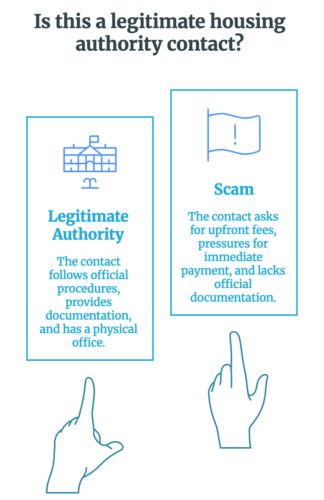
Affordable Housing News: May 2025
May 31, 2025
Affordable Housing News: June 2025
July 7, 2025The U.S. Department of Housing and Urban Development (HUD) is releasing 60,000 new Housing Choice Vouchers in 2025. This is great news for families who need housing help. But scammers are already targeting people who want these vouchers.
Scammers know people are desperate for housing assistance.
They create fake websites, send false emails, and make phone calls pretending to be from housing authorities. They want your money and personal information.
This guide will help you spot these scams and protect yourself while you apply for real Section 8 help.
Why Scammers Target Section 8 Applicants Right Now
The release of 60,000 new vouchers has created a perfect opportunity for scammers. Here’s why:
- Many people are searching online for Section 8 information
- Housing waitlists have been closed for years in many cities
- People are excited and may act quickly without thinking
- Real housing authorities are overwhelmed and hard to reach
- Fake websites can look very real and professional
Scammers know that people who need housing help are often in difficult situations. They may be facing eviction, living in unsafe conditions, or struggling to pay rent. This makes people more likely to believe promises of quick help.
Common Section 8 Voucher Scams to Watch For
| The “Fast Track” Application Scam | How it works: Scammers create fake websites that look like official housing authority sites. They promise to put you at the front of the waitlist for a fee. | Red flags: They ask for upfront payment to apply They promise guaranteed vouchers They say you can skip the waitlist The website URL looks suspicious They pressure you to pay immediately | The truth: Real housing authorities never charge application fees for Section 8. All legitimate applications are free. |
| The Fake Housing Authority Phone Call | How it works: Scammers call pretending to be from your local housing authority. They say your voucher is ready but you need to pay processing fees first. | Red flags: They ask for payment over the phone They want gift cards or wire transfers They pressure you to act immediately They ask for Social Security numbers over the phone They can’t provide official documentation | The truth: Real housing authorities communicate mainly through official mail and their secure websites. They never ask for immediate phone payments. |
| The “Voucher Broker” Scam | How it works: Scammers claim they can sell you someone else’s voucher or help you buy your way onto a waitlist. | Red flags: They offer to sell vouchers They claim to have inside connections They ask for large upfront payments They promise results in unrealistic timeframes They operate only through social media or email | The truth: Section 8 vouchers cannot be sold or transferred to other people. Only official housing authorities can issue vouchers. |
| AI-Generated Rental Listing Scams | How it works: With new vouchers being issued, scammers are also creating fake rental listings to target voucher holders. These listings often use AI-generated photos and descriptions. | Red flags: Photos look too perfect or unrealistic Rent prices seem too good to be true Landlord won’t meet in person They ask for money before showing the property Property descriptions are vague or generic. | For detailed information on spotting these scams, read our guide on spotting AI-generated rental scams. |
| Payment Processing Scams | How it works: Some scammers target people who already have vouchers by offering fake payment processing services. | Red flags: They claim to speed up rent payments They ask for your voucher information They promise to handle payments for you They ask for banking information They charge fees for “expedited processing” | Learn more about protecting yourself from Section 8 payment scams. |
How to Verify Real Section 8 Information
Only Trust Official Sources
Legitimate sources include:
- HUD.gov – The official HUD website
- Your local public housing agency website
- USA.gov Section 8 resources
- Official .gov websites only
Warning signs of fake websites:
- URLs that don’t end in .gov
- Websites asking for upfront payments
- Poor grammar and spelling errors
- No official contact information
- Pressure to act immediately
How to Contact Your Real Housing Authority
Safe ways to find your local PHA:
- Use the official HUD website to find your local agency
- Call the number listed on official .gov websites
- Visit the physical office in person
- Look up the agency in your local phone book
When calling, verify by asking:
- For their official mailing address
- About their current waitlist status
- For their official website URL
- About their application process
- If they charge any fees (they shouldn’t)
Red Flags That Always Mean It’s a Scam
Watch out for these warning signs that always indicate a scam:
| Money Demands | Any request for upfront payment Demands for gift cards or wire transfers “Processing fees” or “application fees” Payments through apps like Venmo or Cash App Requests for credit card information |
| Pressure Tactics | Claims that you must act immediately Threats that you’ll lose your spot Limited time offers Refusal to provide written information Pressure to keep the conversation secret |
| Unrealistic Promises | Guaranteed vouchers Skipping waitlists Vouchers available immediately Special deals or insider access Too-good-to-be-true rental prices |
| Suspicious Communication | Contact only through social media Email addresses that don’t match official agencies Phone numbers that aren’t listed officially Refusal to meet in person Poor grammar and spelling in official documents |
How Real Section 8 Applications Work
Understanding the real process helps you spot fakes:
The Real Application Process
- Applications are always free
- You apply directly with your local housing authority
- Most applications are done online through official websites
- You may need to apply in person at some agencies
- There are no shortcuts or ways to skip ahead
Real Communication Methods
- Official letters sent by mail
- Secure online portals on .gov websites
- Phone calls from verified agency numbers
- In-person meetings at official offices
- Email from official .gov email addresses
Real Timeline Expectations
- Waitlists can be years long
- Processing takes time
- No one can guarantee when you’ll receive help
- Updates come through official channels only
- Emergency cases follow special procedures
Protecting Your Personal Information
Scammers want your personal information to steal your identity or commit fraud. Here’s how to protect yourself:
Never Give Out:
- Social Security numbers over the phone
- Banking information to unverified callers
- Personal information through email
- Copies of identification documents
- Details about your income or family
Safe Information Sharing:
- Only provide information through official websites
- Give documents in person at verified offices
- Use secure online portals with .gov addresses
- Keep copies of everything you submit
- Verify who you’re talking to before sharing anything
What to Do If You’ve Been Targeted
If You Gave Money to Scammers:
- Contact your bank immediately
- Report the fraud to your local police
- File a complaint with the FTC at ReportFraud.ftc.gov
- Contact your state attorney general’s office
- Keep all documentation of the scam
If You Gave Personal Information:
- Monitor your credit reports closely
- Consider placing a fraud alert on your credit
- Watch for unauthorized accounts or charges
- Report identity theft to the FTC
- Change passwords on all your accounts
How to Report Section 8 Scams:
- Contact HUD’s fraud hotline
- Report to your local housing authority
- File complaints with state consumer protection agencies
- Report fake websites to the hosting company
- Share information with other potential victims
Signs Your Housing Authority Contact Is Real

Real Housing Authorities:
- Have official .gov websites
- Are listed in HUD’s official directory
- Have physical offices you can visit
- Provide free applications and services
- Follow official HUD procedures and timelines
They Will:
- Send official letters on letterhead
- Provide official documentation
- Allow you time to review documents
- Never ask for immediate payment over the phone
- Give you contact information for verification
They Won’t:
- Ask for upfront fees
- Pressure you to pay immediately
- Promise guaranteed results
- Contact you only through social media
- Ask for payment through gift cards or wire transfers
Stay Safe While Seeking Housing Help
The release of 60,000 new Section 8 vouchers is real and could help many families. But scammers are using this opportunity to steal money and personal information.
Remember these key points:
- Section 8 applications are always free
- Real housing authorities use official .gov websites
- No one can guarantee you a voucher or skip waitlists
- Never pay money upfront for housing assistance
- Always verify information through official channels
Take your time when applying for housing help. Real opportunities will still be there tomorrow. Scams pressure you to act immediately.
If something seems too good to be true, it probably is. When in doubt, contact your local housing authority directly using information from official HUD websites.
By staying informed and cautious, you can protect yourself from scams while pursuing legitimate housing assistance. The real help is out there, but you need to know how to find it safely.




